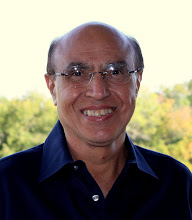By a strange coincidence, the better halves of most of my buddies are either teachers or librarians. Since I enjoy reading, I could not be better connected. One of my connections, Kathy Letchworth, teaches eighth grade in a middle school in Plano. On the last Friday of every month, she invites a guest speaker to address her students.
"I would like you to share your life lessons and give them advice," she told me. Since I haven't attained guruhood as yet, I told Kathy that I'd settle for something more prosaic. I'd prefer to talk about the importance of writing in everyday life.
I am a person from the Orient, and I was not sure what my first classroom experience in the U.S would be. My doubts were unfounded. Kathy's students were polite, disciplined, interactive and respectful.
I made my points briefly (I hope). Writing figures into many everyday activities, from framing an e-mail, compiling a to-do list, writing a memo in an office to sitting down to pen an old-fashioned letter. I asked the class to think of the situations that occur in the course of a day that call for some sort of communication by writing. It became clear that words are like money. Words are the notes and coins we use when we transact business, deal with issues that affect our interests, and, above all, when we express our feelings.
The interaction threw up two interesting facts: First, we spend as much time each day writing as we do eating our three basic meals – that is, 43,200 minutes a year; second, IM (instant messaging) is considered old hat now, since TM (text messaging) is more flexible.
There was occasion to share with the students instances where my published writing had telescoped distance and connected me with like-minded people; introduced me on a personal level to wonderful people whom I would never have come to know otherwise; and, closer to home, had helped to turn acquaintances into friends.
Once the interaction started, the questions went beyond writing. The healthy curiosity of the young touched on my background, my travels and my opinions on issues like arranged marriages. One fact startled them: I've seen girls and boys in a Third World country attend an open-air school where, because trees grew at great distances from each other in that arid climate, different grades shared two sides of the same tree.
The greatest surprise came a few days later, when Kathy forwarded me handwritten letters from each of her students – 21 in all. The students shared their reactions to my views on writing.
Reading these responses gave me a sense of fulfillment. They were my reward. I could not have asked for a better one. Asia wrote: "I never thought of writing in the way you explained it. I always thought the writing process was: plans, drafts, editing and final copy."
I had told them that writing was more of a mental and less than a physical act. Whether the medium is the computer, TM, IM or plain old-fashioned paper, the process of writing remains the same. Asia went on to make a critical connection: "Maybe one day I will use this information for writing music."
I was gratified to see that most of them had been forthright. "When you said writing creates magic, I wasn't sure I knew what you were talking about. After you explained it, it made me realize I can write stories and make them come to life," wrote Angel.
Hunter framed his reaction this way: "Writing is one way I can release all my feelings. ... I can just spill it out, all on paper."
The letters proved that the young are willing to open up, share their thoughts and feelings and bridge the generation gap, if we older folk have the time to listen
Appeared in The Dallas Morning News dated 5th June 2008
Sunday, June 29, 2008
Subscribe to:
Post Comments (Atom)


No comments:
Post a Comment